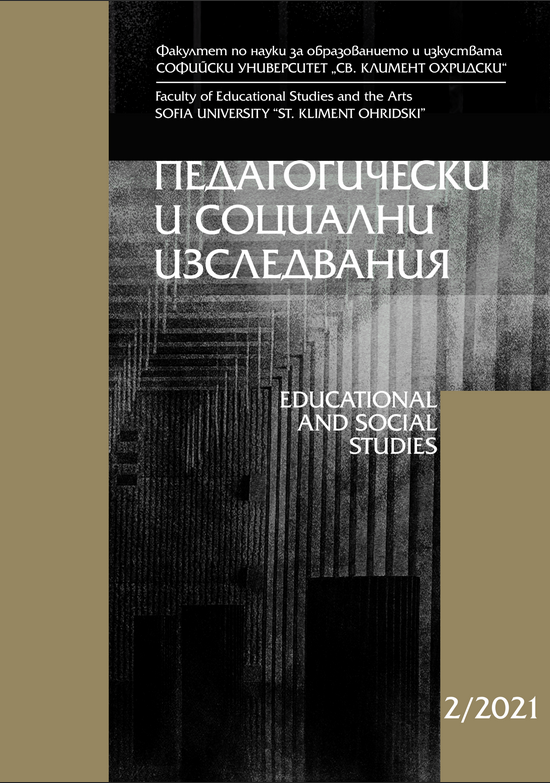Innovative methods and techniques for student assessment
Keywords:
assessment methods and techniques, innovative methods and techniques for assessment and reflection of studentsAbstract
Student assessment is a key component in the teaching process. Not only the diagnostic of students' academic achievements but
also their motivation and success in school depends on its effectiveness. Assessment is in a dynamic relationship with reflection, which allows for better planning, organizing and conducting teaching and learning. Therefore, assessment must be conducted with a variety of methods and techniques, including non-traditional, to perform its ascertaining, diagnostic, motivational and prognostic functions in the learning process. This article discusses the nature and pedagogical possibilities of some innovative methods and techniques for assessment and reflection. Many of them are used successfully in the work of very effective teachers but are not yet applied in mass practice.
References:
Andreev, M. (2001). The learning process: Didactics. Sofia: UI „Sv. Kliment Okhridski“.
Vassilev, V. (2006). Reflection in knowledge, self-knowledge and practice. Plovdiv: Macros.
Gyurova, V., Bozhilova, V., Valkanova, V., Dermendzhieva, G. (2006). Interactivity in the learning process. Sofia: Europress.
Delibaltova, V. (2018). Nature and limits of the evaluation of the learning outcomes. In: Chavdarova – Kostova, S., V. Delibaltova, D. Gospodinov. (2018). Pedagogy. Sofia: UI „St. Kliment Ohridski“.
Sternberg, R. & Williams, W. (2014). Educational Psychology. Sofia: East-West.
Petrov, P. (2016). Modern didactics. Sofia: Avangard Prima.
Radev, P. (2005). General school didactics. Plovdiv: UI „Paisii Hilendarski“.
ORDINANCE № 11 of 01.09.2016 for evaluation of the results of the students' education Prom. – SG, no. 74 of 20.09.2016, in force since 20.09.2016; ed. and add., no. 78 from 29.09.2017, in force from 29.09.2017.
Active Learning and Teaching Methods for Key Stage 1&2. (2007). Belfast: A PMB Publicaton.
Black, P. & Wiliam, D. (2009). Developing the theory of formative assessment. Educational Assessment, Evaluation and Accountability, 21 (1), 5 – 31.
Me Inc.Thematic Unit. (2008). Belfast: CCEA. https://ccea.org.uk/.
Mueller, J. (2005). The authentic assessment toolbox: enhancing student learning through online faculty development. Journal of Online Learning and Teaching, 1(1), 1 – 7. Mueller, J. (2016). Authentic assessment toolbox. http://jfmueller.faculty.noctrl.edu/ toolbox/whatisit.htm.
Ogle, D. (1986) K-W-L: A Teaching Model That Develops Active Reading of Expository Text. The Reading Teacher. 1986, 39, 564 – 570.
Saarinen, A., Seitamaa-Hakkarainen, P., & Hakkarainen, K. K. (2017). The functions and benefits of the eportfolio in craft education at the primary level. Design and Technology Education: an International Journal, 21(3).
Stan, L. A. (2021). The „Traffic Light“ Method in the Context Evaluation-Self-Evaluation of Preschoolers. Acta Didactica Napocensia, 14(1), 208 – 213.
Theodosiadou, D., & Konstantinidis, A. (2015). Introducing e-portfolio use to primary school pupils: Response, benefits and challenges. Journal of Information Technology Education: Innovations in Practice, 14(1), 17 – 38.
Wiggins, G. P. (1993). Assessing student performance: Exploring the purpose and limits of testing. Jossey-Bass.
Moon, J. (2004). A Handbook of Reflective and Experiential Learning: Theory and Practice. London, NY: Routledge.
Gibbs, G. (1988). Learning by doing: a guide to teaching and learning methods. Oxford: Further Education Unit, Oxford Polytechnic.
Yang, J. (2018). Teachers’ Role in Developing Healthy Self-esteem in Young Learners: A study of English language teachers in Finland. Joensuu: University of Eastern Finland.
Black, P. & Wiliam, D. (2009). Developing the theory of formative assessment. Educational Assessment, Evaluation and Accountability, 21 (1), 5 – 31.
Möller, J., & Marsh, H., W. (2013). Dimensional Comparison Theory. Psychological Review, 120 (3), 544 – 560.





